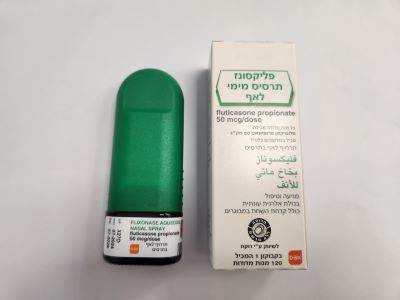Quest for the right Drug

פליקסונז תרסיס מימי לאף FLIXONASE AQUEOUS NASAL SPRAY (FLUTICASONE PROPIONATE)
תרופה במרשם
תרופה בסל
נרקוטיקה
ציטוטוקסיקה
צורת מתן:
אפי : NASAL
צורת מינון:
אין פרטים : NASAL SPRAY, SUSPENSION
עלון לרופא
מינוניםPosology התוויות
Indications תופעות לוואי
Adverse reactions התוויות נגד
Contraindications אינטראקציות
Interactions מינון יתר
Overdose הריון/הנקה
Pregnancy & Lactation אוכלוסיות מיוחדות
Special populations תכונות פרמקולוגיות
Pharmacological properties מידע רוקחי
Pharmaceutical particulars אזהרת שימוש
Special Warning עלון לרופא
Physicians Leaflet
Special Warning : אזהרת שימוש
4.4 Special warnings and precautions for use For OTC : Treatment should be stopped or the advice of a doctor sought if an improvement is not seen within 7 days. The advice of a doctor or pharmacist should also be sought if symptoms have improved but are not adequately controlled. This medicine should not be used for more than 3 months continuously without consulting a doctor. Medical advice should be sought before using this medicine in the case of; • concomitant use of other corticosteroid products, such as tablets, creams, ointments, asthma medications, similar nasal sprays or eye/nose drops • fever or an infection in the nasal passages or sinuses. • recent injury or surgery to the nose, or problems with ulceration in the nose. For Rx and OTC Local infections: infections of the nasal airways should be appropriately treated but do not constitute a specific contra-indication to treatment with Flixonase Aqueous Nasal Spray. The full benefit of Flixonase Aqueous Nasal Spray may not be achieved until treatment has been administered for several days. Care must be taken while transferring patients from systemic steroid treatment to Flixonase Aqueous Nasal Spray if there is any reason to suppose that their adrenal function is impaired. Although Flixonase Aqueous Nasal Spray will control seasonal allergic rhinitis in most cases, an abnormally heavy challenge of summer allergens may in certain instances necessitate appropriate additional therapy. Systemic effects of nasal corticosteroids may occur particularly at high doses prescribed for prolonged periods. These effects are much less likely to occur than with oral corticosteroids preparation and may vary in individual patients and between different corticosteroids preparations. (please refer to Sections 5.1 and 5.2). Potential systemic effects may include Cushing’s syndrome, Cushingoid features, adrenal suppression, growth retardation in children and adolescents and more rarely, a range of psychological or behavioural effects including psychomotor hyperactivity, sleep disorders, anxiety, depression or aggression (particularly in children). Growth retardation has been reported in children receiving some nasal corticosteroids at licensed doses. It is recommended that the height of children receiving prolonged treatment with nasal corticosteroids is regularly monitored. If growth is slowed, therapy should be reviewed with the aim of reducing the dose of nasal corticosteroid, if possible, to the lowest dose at which effective control of symptoms is maintained. In addition, consideration should be given to referring the patient to a paediatric specialist. Treatment with higher than recommended doses of nasal corticosteroids may result in clinically significant adrenal suppression. If there is evidence for higher than recommended doses being used then additional systemic corticosteroid cover should be considered during periods of stress or elective surgery (see Section 5.1 for data on intranasal fluticasone propionate). The full benefit of fluticasone propionate aqueous nasal spray may not be achieved until treatment has been administered for several days. Ritonavir can greatly increase the concentration of fluticasone propionate in plasma. Therefore, concomitant use should be avoided, unless the potential benefit to the patient outweighs the risk of systemic corticosteroid side effects. Significant interactions between fluticasone propionate and potent inhibitors of the cytochrome P450 3A4 system, e.g. ketoconazole and protease inhibitors, such as ritonavir and cobicistat, may occur. This may result in increased systemic exposure to fluticasone propionate (see 4.5 Interaction with Other Medicinal Products and Other Forms of Interaction). Visual disturbance Visual disturbance may be reported with systemic and topical corticosteroid use. If a patient presents with symptoms such as blurred vision or other visual disturbances, the patient should be considered for referral to an ophthalmologist for evaluation of possible causes, which may include cataract, glaucoma or rare diseases such as central serous chorioretinopathy (CSCR) which have been reported after use of systemic and topical corticosteroids. Flixonase Aqueous Nasal Spray contains 0.02 mg benzalkonium chloride in each unit dose, which may cause bronchospasm. Benzalkonium chloride may cause irritation or swelling inside the nose, especially if used for a long period of time.
Effects on Driving
4.7 Effects on ability to drive and use machines None reported.

שימוש לפי פנקס קופ''ח כללית 1994
לא צוין
תאריך הכללה מקורי בסל
לא צוין
הגבלות
לא צוין
מידע נוסף
עלון מידע לצרכן
22.03.18 - עלון לצרכן 24.04.18 - עלון לצרכן 04.10.18 - עלון לצרכן אנגלית 04.10.18 - עלון לצרכן עברית 04.10.18 - עלון לצרכן ערבית 22.11.23 - עלון לצרכן עברית 23.02.24 - עלון לצרכן אנגלית 23.02.24 - עלון לצרכן עברית 23.02.24 - עלון לצרכן ערבית 12.04.24 - עלון לצרכן עברית 07.05.24 - עלון לצרכן אנגלית 07.05.24 - עלון לצרכן ערבית 01.08.24 - עלון לצרכן ערבית 28.11.23 - החמרה לעלוןלתרופה במאגר משרד הבריאות
פליקסונז תרסיס מימי לאף